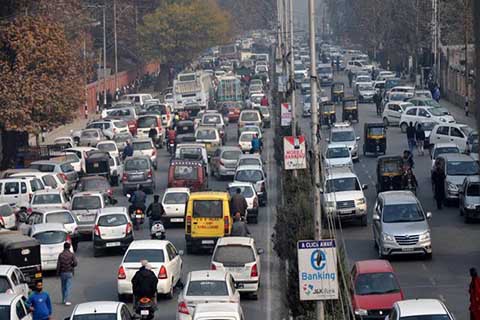The journey from the tranquil valleys of Jammu and Kashmir to the bustling metropolis of Hyderabad is one many of us undertake with hope—for education, employment, or a better future. Yet, for some, this migration takes a darker, more painful turn. What I’ve witnessed on the streets of my new city is a stark and deeply troubling reality: people from my homeland, including some from the Pir Panjal region-chenab valley- and Kashmir Valley, are not here for work or study, but to seek alms. Seeking alms isn’t a shame as people with various types of disabilities and disfunctionalities do engage in begging. But the problem rises when it is done as a regular profession by people who otherwise are healthy and moderately well to do.
It’s a sight that shames us all. They sleep on footpaths, huddle in the open air outside shops, and gather near places of worship. They use a fabricated narrative of desperation to solicit money. “We don’t have food back home,” they plead. “The state has suppressed us.” They invoke our faith, begging “in the name of Allah,” a manipulation of the very empathy that we, as a community, hold dear.
What is most shocking is the scale of this operation. It’s not a few isolated individuals; it’s an organized network. We spoke to a few of them, and it was a gut-wrenching revelation—almost fifty people from a single, small area in Pir Panjal are here, operating in this manner. They are so well versed, so fluent in their deceit, it’s clear this is not a new venture for them.
Another lot that is constantly bringing shame to us is the scammers who approach well-meaning strangers with offers of authentic Kashmiri goods—saffron, walnuts, and dry fruits—taking money with promises to deliver, only to vanish into the crowd. Again, these aren’t just a few isolated incidents; it’s a systematic pattern of fraud that is eroding the trust people have in us, one lie at a time. This isn’t just happening in Hyderabad. I’ve heard similar stories from friends in Delhi, Mumbai, and Uttar Pradesh. It’s a widespread problem, a creeping stain on our collective image.
For students like myself, this has direct, painful consequences. The shame and frustration we feel is immense. We are not just fighting to build our own lives; we are also fighting against a stereotype created by those who would rather exploit others than work honestly. A few days ago, my friend broke his finger playing cricket. When we went to a doctor’s home for help, he met us at the door with a look of suspicion and disdain. “You Kashmiris,” he snapped, “are coming every day to beg.” We were stunned. We had to explain, with a knot in our stomachs, that we were there for medical help, not charity. He apologized, but the damage was done. He then narrated his own shocking stories of being scammed by people from the Valley. This was not a one-off encounter. The actions of a few are making every single one of us a suspect.
This phenomenon is a profound crisis of identity and integrity. The fraudulent actions of these individuals are not only exploiting the empathy of people across India but are also creating a dangerous and false perception that we, as a community, are dishonest. It paints a false picture of our people, our culture, and our homeland, making it harder for every Kashmiri pursuing a genuine path to be seen for who they are.
The people I’ve seen on the streets are not all poor; some of them, we learned, come from relatively well-off families back home. This isn’t a simple case of desperation born of poverty. It is a calculated act of deception, a willingness to leverage a community’s struggles for personal gain. This betrayal of trust is unforgivable. They are not just tarnishing their own reputations; they are damaging the image of every Kashmiri student, professional, and artisan trying to make a life honestly.
The true victims are not only the people being scammed, but every single Kashmiri who is now unfairly judged. Our shared identity, which should be a source of pride, is being devalued and sullied. It is a problem that demands a closer look—not just at the poverty that may drive some to these actions, but at the organized exploitation that has no place in our society. This is not a matter we can ignore. We must speak out against it, not to demonize our own, but to protect our collective dignity and restore the trust that is being so recklessly squandered. The future of how we are perceived in the rest of India is at stake, and it is a battle we must fight with integrity and honesty.
The writer is an author, a student of political science and international relations. aamiraltaf16@gmail.com


